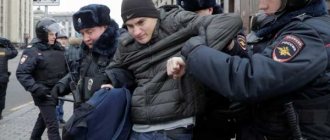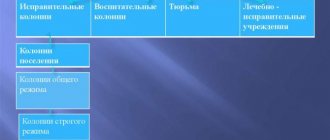1. Violations of the order and conditions of serving a sentence in the form of restriction of freedom are: a) failure of a convicted person to appear without good reason at the penal inspection for registration; b) non-compliance by the convicted person with the restrictions established by the court without good reason; c) failure of a convicted person to appear at the penal inspection when called without good reason to give oral or written explanations on issues related to serving his sentence; d) failure of the convicted person to appear without good reason at the penal inspection for registration; e) violation of public order for which the convicted person was brought to administrative responsibility; f) failure by the convicted person to comply with the requirement specified in part three of Article 50 of this Code.
2. For violation by a convicted person of the order and conditions of serving a sentence in the form of restriction of freedom, the penal inspection shall apply to him a sanction in the form of a warning. If a convicted person commits, within one year after issuing a warning, any of the violations specified in part one of this article, the criminal-executive inspection shall apply a penalty to him in the form of an official warning about the inadmissibility of violating the restrictions established by the court.
3. In the event of a violation by a convicted person of the order and conditions of serving a sentence in the form of restriction of freedom, as well as in the presence of other circumstances indicating the advisability of supplementing the restrictions previously established for the convicted person, the head of the penal inspection or his deputy may make a corresponding submission to the court.
4. The following are considered to be maliciously evading serving a sentence in the form of restriction of freedom: a) a convicted person who has committed a violation of the order and conditions of serving the sentence within one year after the application of a penalty to him in the form of an official warning about the inadmissibility of violating the restrictions established by the court; b) a convicted person who has refused to use technical means of supervision and control in relation to him; c) a convicted person who has fled from his place of residence, whose location has not been established for more than 30 days; d) a convicted person who has not arrived at the penal inspection at the place of residence in accordance with the order specified in part three of Article 47.1 of this Code.
5. In case of malicious evasion of a convicted person from serving a sentence in the form of restriction of freedom, assigned as the main punishment or chosen as a replacement for the unserved part of the sentence in the form of imprisonment in accordance with Article 80 of the Criminal Code of the Russian Federation, the criminal-executive inspection makes a presentation to the court on replacing his unserved sentence in the form of restriction of freedom with a sentence in the form of imprisonment. Malicious evasion of a convicted person from serving a sentence in the form of restriction of freedom, imposed as an additional punishment, entails liability in accordance with the legislation of the Russian Federation.
6. A convicted person whose location is unknown is put on the wanted list and subject to detention by internal affairs bodies for up to 48 hours in order to resolve issues provided for in part five of this article. This period may be extended by the court to 30 days.
7. After the detention of a convicted person for whom restriction of freedom has been assigned as the main type of punishment or chosen as a replacement for the unserved part of the sentence of imprisonment, the court, in accordance with Article 397 of the Criminal Procedure Code of the Russian Federation, makes a decision to take the convicted person into custody and replace the restriction freedom by deprivation of liberty in accordance with Article 53 of the Criminal Code of the Russian Federation. (Article as amended, put into effect on January 1, 2010 by Federal Law of December 27, 2009 N 377-FZ.
UrDela.ru
Part 1. Violations of the order and conditions of serving a sentence in the form of restriction of freedom are:
a) failure of the convicted person to appear without good reason at the criminal executive inspection for registration;
b) non-compliance by the convicted person with the restrictions established by the court without good reason;
c) failure of a convicted person to appear at the penal inspection when called without good reason to give oral or written explanations on issues related to serving his sentence;
d) failure of the convicted person to appear without good reason at the criminal executive inspection for registration;
e) violation of public order for which the convicted person was brought to administrative responsibility;
f) failure by the convicted person to comply with the requirement specified in part three of Article 50 of this Code.
Part 2. For violation by a convicted person of the order and conditions of serving a sentence in the form of restriction of freedom, the penal inspection applies to him a sanction in the form of a warning. If a convicted person commits, within one year after issuing a warning, any of the violations specified in part one of this article, the criminal-executive inspection shall apply a penalty to him in the form of an official warning about the inadmissibility of violating the restrictions established by the court.
Part 3. In the event of a violation by a convicted person of the order and conditions of serving a sentence in the form of restriction of freedom, as well as in the presence of other circumstances indicating the advisability of supplementing the restrictions previously established for the convicted person, the head of the criminal executive inspection or his replacement may make a corresponding submission to the court.
Part 4. Those who maliciously evade serving a sentence in the form of restriction of freedom are recognized as:
a) a convicted person who has violated the order and conditions of serving a sentence within one year after the application of a penalty in the form of an official warning about the inadmissibility of violating the restrictions established by the court;
b) a convicted person who has refused to use technical means of supervision and control in relation to him;
c) a convicted person who has fled from his place of residence, whose location has not been established for more than 30 days;
d) a convicted person who has not arrived at the penal inspection at the place of residence in accordance with the order specified in part three of Article 47.1 of this Code.
Part 5. In case of malicious evasion of a convicted person from serving a sentence in the form of restriction of freedom, assigned as the main punishment or chosen as a replacement for the unserved part of the sentence in the form of imprisonment in accordance with Article 80 of the Criminal Code of the Russian Federation, the criminal-executive inspection shall introduce the court submitted a proposal to replace his unserved sentence in the form of restriction of freedom with a sentence in the form of imprisonment. Malicious evasion of a convicted person from serving a sentence in the form of restriction of freedom, imposed as an additional punishment, entails liability in accordance with the legislation of the Russian Federation.
Part 6. A convicted person whose location is unknown is put on the wanted list and subject to detention by internal affairs bodies for up to 48 hours in order to resolve issues provided for in part five of this article. This period may be extended by the court to 30 days.
Part 7. After the detention of a convicted person for whom restriction of freedom has been assigned as the main type of punishment or has been chosen as a replacement for the unserved part of the sentence in the form of imprisonment, the court, in accordance with Article 397 of the Criminal Procedure Code of the Russian Federation, makes a decision to take the convicted person into custody and replacing restriction of liberty with deprivation of liberty in accordance with Article 53 of the Criminal Code of the Russian Federation.
‹ Article 57 (PEC RF). Incentive measures applied to those sentenced to punishment in the form of restriction of freedom Up Article 59 (Penal Code of the Russian Federation). The procedure for applying incentives and penalties to those sentenced to punishment in the form of restriction of freedom ›
Commentary on Article 58 of the Criminal Executive Code of the Russian Federation
1. In accordance with Part 1 of the commented article, violations of the order and conditions of serving a sentence in the form of restriction of freedom are disciplinary and administrative offenses, which include the following punishable acts:
— failure of a convicted person to appear without good reason at the Penitentiary Inspectorate for registration;
— non-compliance by the convicted person with the restrictions established by the court without good reason;
- failure of a convicted person to appear at the correctional institute when summoned without good reason to give oral or written explanations on issues related to serving his sentence;
— failure of a convicted person to appear without good reason at the penitentiary institute for registration;
— violation of public order, for which the convicted person was brought to administrative responsibility;
— failure to notify the educational institution about a change in place of work and (or) study.
2. If a convicted person violates the order and conditions of serving a sentence, the Penal Inspectorate applies disciplinary sanctions to him in the form of a warning and an official warning about the inadmissibility of violating the restrictions established by the court.
3. A warning is issued if the convicted person violated the regime and conditions of serving the sentence for the first time and did not receive punishment in the form of a warning.
4. An official warning about the inadmissibility of violating the restrictions established by the court is issued for the commission by a convicted person of any of the violations specified in Part 1 of the commented article within one year after the warning is issued.
5. The head of the correctional institution or his replacement may submit to the court an appropriate submission on the advisability of supplementing the restrictions previously established for the convicted person. The basis for this representation is the convict’s violation of the order and conditions of serving a sentence in the form of restriction of freedom.
6. The grounds for recognizing a convicted person as maliciously evading serving a sentence in the form of restriction of freedom are:
1) violation of the order and conditions of serving a sentence within one year after the application of a penalty to the convicted person in the form of an official warning about the inadmissibility of violating the restrictions established by the court;
2) refusal to use technical means of supervision and control in relation to the convicted person;
3) disappearance from the place of residence of a convicted person whose location has not been established for more than 30 days;
4) failure to arrive at the correctional institution at the place of residence in violation of the order to appear.
7. The legal consequences of a convicted person’s malicious evasion from serving a sentence in the form of restriction of freedom, assigned as the main punishment or chosen in order to replace the unserved part of the sentence in the form of imprisonment, is a submission to the court to replace the unserved term of punishment in the form of restriction of freedom with a punishment in the form imprisonment. The right of such representation is vested in the UII.
8. The internal affairs bodies, which have the right to detain a maliciously evading convict for up to 48 hours, are also involved in the execution of this punishment. If necessary, this period may be extended by the court to 30 days.
9. In the event of the detention of a convicted person for whom restriction of freedom has been assigned as the main type of punishment or has been chosen as a replacement for the unserved part of the sentence of imprisonment, the court makes a decision to take the convicted person into custody and replace restriction of freedom with imprisonment at the rate of one day of imprisonment per day. two days of restriction of freedom.
Article 99. Material and living support for those sentenced to imprisonment
Article 99. Material and living support for those sentenced to imprisonment
[Criminal Executive Code] [Special Part] [Section IV] [Chapter 13]
1. The standard living space per person sentenced to imprisonment in correctional colonies cannot be less than two square meters, in prisons - two and a half square meters , in colonies intended for serving sentences for convicted women - three square meters, in educational colonies - three and a half square meters, in medical correctional institutions - three square meters, in treatment and preventive institutions of the penal system - five square meters.
2. Convicts are provided with individual sleeping places and bedding. They are provided with clothing according to the season, taking into account gender and climatic conditions, personal hygiene products (at least soap, toothbrush, toothpaste (tooth powder), toilet paper, disposable razors (for men), personal hygiene products (for women).
3. Minimum standards for food and material and living conditions for convicts are established by the Government of the Russian Federation. At the expense of enterprises that employ convicts, they can be provided with additional food in excess of the established norms. The norms for clothing allowances for convicts are approved by the federal executive body that carries out the functions of developing and implementing state policy and legal regulation in the field of execution of criminal penalties. Convicts who do not work for reasons beyond their control, convicts who do not receive pensions, are provided with food and basic necessities at the expense of the state.
4. Convicts receiving wages and convicts receiving a pension shall reimburse the cost of food, clothing, household services and personal hygiene products, except for the cost of special food and special clothing. For convicts who evade work, these expenses are withheld from the funds available in their personal accounts. Reimbursement for the cost of food, clothing, utilities and personal hygiene products is made monthly within the limits of actual expenses incurred in a given month.
5. Convicts released from work due to illness, convicted pregnant women and convicted nursing mothers are provided with free food during the period of release from work. Convicts held in educational colonies, as well as convicts who are disabled people of the first or second group, are provided with food, clothing, household services and personal hygiene products free of charge.
6. Convicted pregnant women, convicted nursing mothers, juvenile convicts, as well as sick convicts and convicts who are disabled people of the first or second group, are provided with improved living conditions and increased nutritional standards are established.
7. In addition to the amount of funds established by Articles 121, 123, 125, 131, 133 of this Code that are allowed to be spent on the purchase of food and basic necessities, convicts may, at their own expense, additionally purchase clothing approved for use in correctional institutions, including including sports, pay for additional treatment, preventive and other services provided at their request, determined by the Internal Regulations of Correctional Institutions.
Everything about criminal cases
Go to the text of the PEC
Url Additional information:
Part
I
- Part 1 58 PEC
what is considered a violation of the order of serving restriction of freedom
Part
II
- Part 2 58 PEC
penalty in the form of a warning
Part
III
- Part 3 58 PEC
additions to the restrictions previously established for the convicted person
Part
IV
- Part 4 58 PEC
malicious evasion of restriction of freedom
Part
V
- Part 5 58 PEC
replacing restriction of liberty with imprisonment
Part
VI
- Part 6 58 PEC
search for a convicted person
Part
VI I
- part 7 58 PEC
change to imprisonment
Article 58 of the Penal Code. Responsibility for violating the order of serving restrictions on freedom
1) Violations of the order and conditions of serving a sentence in the form of restriction of freedom are:
a) failure of the convicted person to appear without good reason at the penal inspection for registration;
b) non-compliance by the convicted person with the restrictions established by the court without good reason;
c) failure of a convicted person to appear at the penal inspection when called without good reason to give oral or written explanations on issues related to serving his sentence;
d) failure of the convicted person to appear without good reason at the penal inspection for registration;
e) violation of public order for which the convicted person was brought to administrative responsibility;
f) failure by the convicted person to comply with the requirement specified in Part 3 50 of the Penal Code.
Url Additional information:
— 59 PEC
procedure for applying incentives and penalties
- clause 5.8
Plenum No. 21, when replacing punishment, warnings are checked
2) For violation by a convicted person of the order and conditions of serving a sentence in the form of restriction of freedom, the penal inspection applies to him a sanction in the form of a warning. If a convicted person commits, within 1 year after issuing a warning, any of the violations specified in Part 1 of this article, the criminal-executive inspection shall apply a penalty to him in the form of an official warning about the inadmissibility of violating the restrictions established by the court.
Url Additional information:
-
P . 14
Plenum No. 21 addition of restrictions
3) In case of violation by the convicted person of the order and conditions of serving the sentence in
form
of restriction of freedom, as well as in the presence of other circumstances indicating the advisability of supplementing the restrictions previously established for the convicted person, the head of the penal inspection or his deputy
Url Additional information:
- part 1 396 of the Code of Criminal Procedure
the jurisdiction of this issue is the court that passed the sentence
may make a corresponding submission to the court.
4) Those who maliciously evade serving a sentence in the form of restriction of freedom are recognized as:
Url Additional information:
- clause 5.8
Plenum No. 21 the severity of evasion: checking the warning
a) a convicted person who has violated the order and conditions of serving a sentence within 1 year after the application of a penalty to him in the form of an official warning about the inadmissibility of violating the restrictions established by the court;
b) a convicted person who has refused to use technical means of supervision and control in relation to him;
c) a convicted person who has fled from his place of residence, whose location has not been established for more than 30 days;
d) a convicted person who has not arrived at the penal inspection at his place of residence in accordance with the order specified in Part 3 47.1 of the Penal Code.
5) In case of malicious evasion of a convicted person from serving a sentence in the form of restriction of freedom, assigned as the main punishment or chosen as a replacement for the unserved part of the sentence
in the form of imprisonment in accordance with Article 80 of the Criminal Code, the criminal-executive inspection submits to the court a proposal to replace him unserved term of punishment in the form of restriction of freedom by punishment in the form of imprisonment.
Malicious evasion of a convicted person from serving a sentence in the form of restriction of freedom, imposed as an additional punishment, entails liability in accordance with the law. 6) A convicted person whose location is unknown is put on the wanted list and subject to detention by internal affairs bodies for up to 48 hours in order to resolve issues provided for in Part 5 of this article. This period may be extended by the court to 30 days.
Url Additional information:
- clause 5.8
Plenum No. 21 if the main punishment: then a replacement, if not: then
314 of the Criminal Code
7) After the detention of a convicted person, to whom restriction of freedom is assigned as the main type of punishment or chosen as a replacement for the unserved part of the sentence in the form of imprisonment, the court in accordance with Article 397 The Criminal Procedure Code makes a decision to take the convicted person into custody and replace the restriction of freedom with imprisonment in accordance with Article 53 of the Criminal Code.
Return to the text of the PEC
Seek advice



